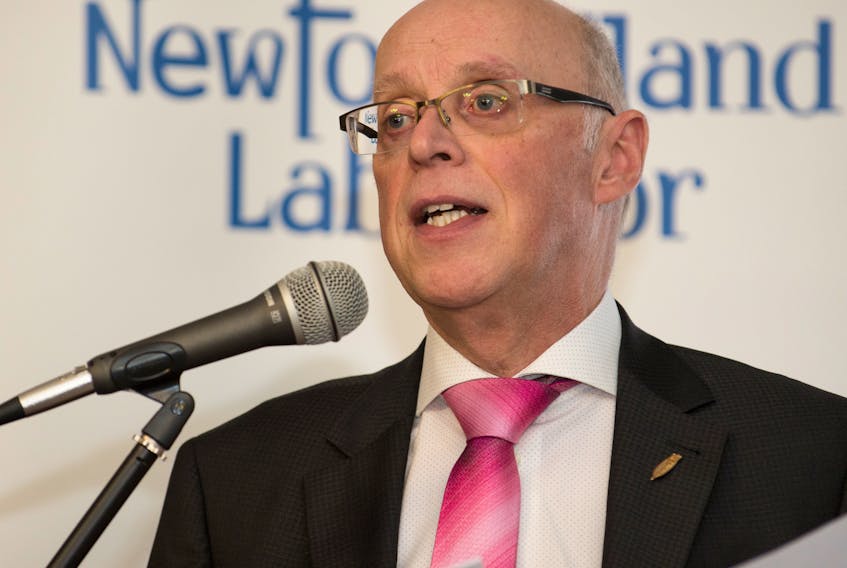Rattling the cages of major health-care organizations in the province might not be the healthiest of ways to start off the Christmas holidays for Health and Community Services Minister John Haggie’s department.
But blunt statements in a CBC news report last week about coming changes to the province’s health-care system — made by the department’s deputy minister, John Abbott — first needled the Registered Nurses Union (RNU) and also caused a headache for the Newfoundland and Labrador Medical Association (NLMA), as detailed in a news release issued Thursday.
“The NLMA was surprised to learn that government has a very ambitious budget reduction target for the health sector, but does not have a comprehensive plan to get there,” said NLMA president Dr. Lynn Dwyer.
“Despite Minister Haggie’s comments that Mr. Abbott was not stating government policy, the transcript of Mr. Abbott’s remarks makes it very clear that he was describing government intentions and actions.”
The CBC report noted Abbott spoke during a panel discussion at Memorial University about such things as the creation of primary health teams that could change the way patients receive care, with doctors and nurses being reoriented to where they are needed. Abbott said it’s possible to shave several hundred million dollars from the province’s health budget. He said work is already underway to review how the province deploys its health services.
Abbott also suggested the province has too many doctors and nurses, and that some services should be cut and some facilities closed because they are costing the government too much money.
He added that there may be opportunities to replace some RNs with LPNs, who have less training and are paid less, and that planning for changes is underway.
Registered Nurses Union president Debbie Forward had responded by saying nurses felt the comments were a “slap in the face” and that ongoing collective bargaining negotiations could be upended by Abbott’s comments. She said there is a need for more nurses, not less.
Dwyer said doctors in the province were disturbed by the comments, as well. She said the comments reveal the government is implementing health-care reform without indicating the extent of the impact and without adequate consultation with health system stakeholders or the public.
“There is also a question of whether government even has a guiding plan for this health reform,” Dwyer said. “If there is such a plan, why has it never been revealed to stakeholders or the public? How do we know the direction of the government if it has never revealed the goals or fiscal targets or the magnitude of the impacts? The lack of transparency is disappointing.”
Haggie, however, said Thursday the NLMA, through committees and discussions with the government, has been aware of possible changes and has been providing input into the reform process all along.
The minister said he was surprised at the contents of the NLMA news release.
What the NLMA is basically referencing, he said, is an independent review request of the health-care system it made in early 2017. He said such a formalized review is not necessary because it’s been going on for some time.
“My view of this is they actually have effectively had that, although not as one single process, but as multiple parallel processes that have existed for some years and is still going on,” Haggie said. “And they are actively involved in those and have been all along.
“I think some of this is a reaction from the noise of the previous week. The NLMA have ready access to the department. My staff was out meeting with them last week.
“In actual fact we have had regular discussions with the NLMA on a whole variety of the elements within the health-care system that make up, if you like, the kind of grand plan they say is lacking. They themselves acknowledge that we have had many specific reviews and changes, and The Way Forward (Liberal government’s vision paper) spells it out.”
Haggie added that Abbott’s comments must be put into context.
“That was an academic panel at the Harris Centre (at Memorial University) to which he was invited based on his years of experience in the health-care system, and to provide some facts and be provocative,” Haggie said. “He certainly did both. The facts you can’t distance yourself from. They do exist. What my discussion thereafter has been, as far as the nurses and the medical association … is essentially that that voice is one of many. The NLMA, the RNU have had regular access to myself and the department as well the minister of finance, and all the officials they feel they’d like to talk to.
“I’ve had emails from constituents, emails from practitioners, both current and retired, in a variety of health-care fields who have expressed views. And this all goes into the policy process.
“But at the end of the day, the people who make the policy decisions are the elected officials, the caucus, the cabinet, ministers responsible for the portfolio in conjunction with the premier. It’s not the civil service. The civil service are there to advise and provide input. They are also there to implement the decisions made by the elected officials.”
The NLMA said it is concerned with “government’s misunderstanding about the work of physicians.”
“The government is focusing on reducing expenditures down from 125 per cent of national per capita rates to about 115 per cent, and suggests physician costs are part of the problem,” Dwyer said. “What it fails to understand is that per capita physician costs in the province are already below the national average, at 95 per cent, whereas hospital spending is far above the national average at 146 per cent. Physicians are prepared to play their part in getting costs down, but they already are one of the most cost-effective components of the health-care system. Government should focus on the parts of the system where costs are truly high.”
In its news release, the NLMA said many of the changes to services spelled out in The Way Forward and by Haggie — such as primary health care and mental-health improvements — are initiatives adding services and costs to the health system, or are being promoted as cost neutral. They do not add up to a comprehensive health reform plan.
“The best way to get ready for the scale of change revealed in the deputy minister’s remarks is a wide open, transparent, comprehensive planning process,” Dwyer said. “It is the only way to ensure that quality care and good health outcomes can be preserved while cost reductions are being implemented.”









